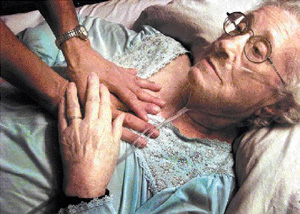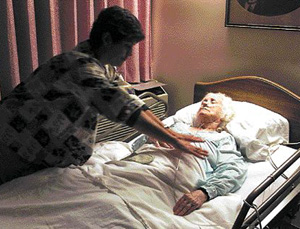Some area facilities in touch with residents
Mercy Siena Woods, Brookhaven a couple of Miami Valley's best

|
© 1999 Dayton Daily News
At Mercy Siena Woods, you might hear family and friends singing softly to a dying loved one, or the silence of another patient's meditation, or the resident cocker spaniel, Sophie, chewing on a squeakie toy in the activities center.
In the hallways, you might pick up the relaxing scent of herbs and fragrant oils, a healing technique known as aromatherapy that has become part of the home's holistic approach to care.
"It's almost like family there," said Miriam Johnson, whose 89-year old mother Ethel Flaugher has been a resident of Mercy Siena Woods for the past four years. "Everyone is so willing to please, even down to the (nurse's) aides."

BOTTOM: RN CAROL BURNS moves her hands over resident Opal McFadden, providing some healing touch at bedtime. |
Other nursing homes in the Dayton area tallying more than one deficiency-free survey in recent years include Brookhaven Nursing and Care Center in Brookville, Lincoln Park Manor in Kettering and Shiloh Springs Care Center in Trotwood.
What accounts for a quality nursing home?
Lisa Heermans, director of the long-term care ombudsman office for the Dayton area, said the difference starts at the top.
At the best nursing homes, administrators "are out and about in the home," she said. "They know the residents. They know their staff. They know their names, know their families . . . They're thinking morning, afternoon and night that their residents are what's important."
Creating a "homey" atmosphere is another important factor, said Judy Turner, executive director of the Miami Valley chapter of the Alzheimer's Association, noting that Mercy Siena Woods is one of the best in the Dayton area in that regard.
But "the staff in any facility is what counts most," she said. And the best homes, including Mercy Siena Woods, "make a strong effort to train their staff."
Mercy Siena Woods trains its aides not only in technical skills, like lifting and bathing, but in "how to give good customer service . . . They learn how to apologize if something goes wrong and how to make things right," said director of nursing Cheri Bombok. "People aren't born knowing that."
Beyond the state's required 75-hour training program, nurse's aides at Mercy Siena Woods receive another three days to two weeks of orientation, including at least four hours of training in how to care for Alzheimer's residents. Those working in the Alzheimer's special care unit get 12 hours of additional training. Experienced aides act as mentors for beginners as well.
Recruiting and retaining dedicated, compassionate nurse's aides has become more difficult than ever during the nation's ongoing economic boom. Nursing homes are competing for the same pool of workers against the fast-food industry and other retail operations, where the work is less back-breaking and the conditions less stressful.
A non-profit enterprise of Catholic Health Care Partners, sponsored by the Sisters of Mercy of the Americas, Mercy Siena Woods decided four years ago it would have to raise its pay scale to continue to attract committed, quality aides. Wages there still remain modest, but are moving up. "Ninety-seven percent of our associates are paid above the poverty level," said Glenna Shiverdecker, director of human resources. "And we try to be as flexible as we can with scheduling."
To make sure no patient's care is short-changed, aides divide the workload using a scoring system that grades the needs of each patient. The greater the need, the higher the score. Patients are then assigned so that all aides have an equal total score of patient needs to tend to.
"The nurse's aides themselves do this. It's not top down," said administrator Susan Hayes. "If we didn't have an empowered staff, it wouldn't work."
|
'(Good administrators) are out and about in the home. They know the residents. They know their staff. They know their names, know their families . . . They're thinking morning, afternoon and night that their residents are what's important.' LISA HEERMANS
Director of the long-term care |
Brookhaven is a for-profit operation, managed by Kettering-based Centurion Management Group. The home draws its seven-member board exclusively from Brookville and the surrounding areas. For that reason, said Brookhaven executive director Mike McKinniss, the owners are more in touch with the community and its needs.
"Whenever you go to a (board) meeting and you need something, they're here for us," McKinniss said. "I think the quality comes from the top down."
Marketing director Bill Piper says hiring local residents from the surrounding towns and farm areas gives Brookhaven a definite advantage. "The majority of them are very hardworking and caring people," he said.
"And it's a very, very stable staff," he added. "We have some nursing assistants and nurses who have been here for 15 or 20 years."
The same stability exists at Mercy Siena Woods, where some staff members have 25 years of experience at the same facility.
Both Brookhaven and Mercy Siena Woods have launched innovative programs over the years.
Brookhaven assigns a nurse and two full-time assistants to its restorative care program, designed to maintain and even improve the gains of patients who recently have been hospitalized or finished a course of rehabilitative therapy.
Twenty years ago, Mercy Siena Woods was one of the first nursing homes in the Dayton area to have pets on the premises to add warmth to residents' lives. Mercy Siena is now home to two cats, three visiting dogs, 10 birds and five aquariums. Staff members also bring in their own children at times to mix with residents.
Ten years ago, Mercy Siena Woods formed an ethics committee to help family and staff make decisions on how to better accommodate dying patients. The home has worked closely with Hospice of Dayton and has created an end-of-life policy that respects every patient's dying wishes.
"We had a resident in the Alzheimer's unit who was dying -- the whole day his family and friends sang, and at 7 o'clock that night, the patient died," Hayes said. "I think that's a neat way to die."
The staff has gone out of its way to honor other patients' requests, including one's wish to return home for a final night and another's to have her dog by her side.
Hayes said the thrust at Mercy Siena Woods these days "is to be less institutional and more humanitarian."
Eight renovations over the last eight years have created homier touches throughout the facility, including a variety of garden views, wallpaper, wood trim and softer lighting in the hallways and rooms, private dining areas and tablecloths on all the dining tables.
The sight of a bare chainlink fence outside an emergency doorway, which someday will be covered with greenery, spurred Hayes to vow, "We're not quite there yet, but we're getting better."
A home-like setting for nursing homes, she said, "is where the future is. People don't want to die in an institution. They want to die at home. And I think the more home-like we are, the easier it is for people to make that transition."
 LISA POWELL / DAYTON DAILY
TOP: RESIDENT OPAL MCFADDEN holds the hands of registered nurse Carol Burns during a healing touch session at Mercy Siena Woods. Burns performs the alternative therapy with McFadden, who says it helps her feel calm and peaceful. The therapy is an effort to address residents' spiritual and medical needs.
LISA POWELL / DAYTON DAILY
TOP: RESIDENT OPAL MCFADDEN holds the hands of registered nurse Carol Burns during a healing touch session at Mercy Siena Woods. Burns performs the alternative therapy with McFadden, who says it helps her feel calm and peaceful. The therapy is an effort to address residents' spiritual and medical needs.